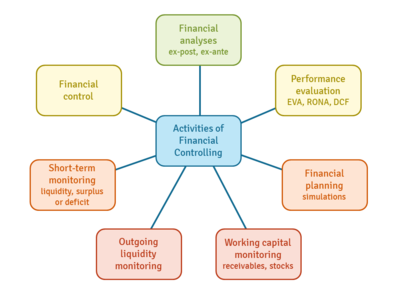Financial controlling: Difference between revisions
(The LinkTitles extension automatically added links to existing pages (<a target="_blank" rel="noreferrer noopener" class="external free" href="https://github.com/bovender/LinkTitles">https://github.com/bovender/LinkTitles</a>).) |
|||
| Line 25: | Line 25: | ||
Financial controlling makes use of procedures and management accounting data such as: | Financial controlling makes use of procedures and management accounting data such as: | ||
* Directing of [[resource]] and financial flow and constant cash flow forecasting, | * Directing of [[resource]] and financial flow and constant cash flow [[forecasting]], | ||
* Monitoring of current assets, | * Monitoring of current assets, | ||
* Monitoring fixed assets (necessary for such management decisions as: purchase, manufacture, operation, maintenance, repair, sale or liquidation), | * Monitoring fixed assets (necessary for such management decisions as: purchase, manufacture, operation, maintenance, repair, sale or liquidation), | ||
Revision as of 05:25, 20 January 2023
| Financial controlling |
|---|
| See also |
Financial controlling is part of the company's management system. Its main task it to achieve liquidity and company's ability to pay its obligations at proper time. It could be represented in the form of three-phase cycle of planning, implementation and control.
Phase of planning and control of individual sub-tasks are carried out by controller or financial manager, and the phase of implementation by the CEO.
Objectives and tasks of financial controlling
- provide the proper structure of liquidity,
- maintenance of current liquidity,
- keeping of liquidity reserve,
- provide financing for development projects.
Financial controlling makes use of procedures and management accounting data such as:
- Directing of resource and financial flow and constant cash flow forecasting,
- Monitoring of current assets,
- Monitoring fixed assets (necessary for such management decisions as: purchase, manufacture, operation, maintenance, repair, sale or liquidation),
- Control of costs,
- Reporting for managers
- Calculations, pricing decisions, profit planning
Applications of financial controlling
Financial plans of individual business areas should be monitored for their impact on the balance sheet structure of assets and liabilities.One goal of financial controlling is making a forecasts of business in the future (planning company's balance sheet, such as at the end of fiscal year). Due to the fact that changes in the balance sheet items arise from different types of budget, the controlling budget integrates all other forecasts and plans. It is a tool which shows changes in financial position for the financial year.
Financial controlling vs financial planning
Financial controlling focuses on raising capital needed to finance the operations of the organization, and their appropriate utilization to ensure its survival and development. With measurable indicators used to identify future activities and break them into parts in accordance with the organizational structure and budgets, it combines the function of monitoring and planning.
Financial planning (budgeting) consists of:
- Budget for variable costs, where costs vary with the size of the planned changes in production and sales,
- Budget for fixed costs, used to pay the expenses which remain relatively constant, and are not subject to changing with changing sales or production.
One can distinguish several basic budget plans:
- Sales and expense budget
- Capital expenditure
- Loans budget
- Balances
There are many problems in the areas of financial management associated with:
- cash required to achieve its objectives,
- costs that are associated with different ways of financing economic activity,
- how to reduce the cost of running the organization,
- the profitability and direction of investment of accumulated capital,
- way to reconcile the requirements of profitability and liquidity.
References
- Fekete Farkas, M., & Gonda, G. (2010). Comparison of controlling tools of different sales structures: case studies. Polish Journal of Management Studies, 2, 44-56.
- Chapman, C. S. (2005). Controlling strategy: management, accounting and performance measurement. Oxford University Press.
- Usry, M. F., & Carter, W. K. (1993). Cost accounting. South-Western Pub.
